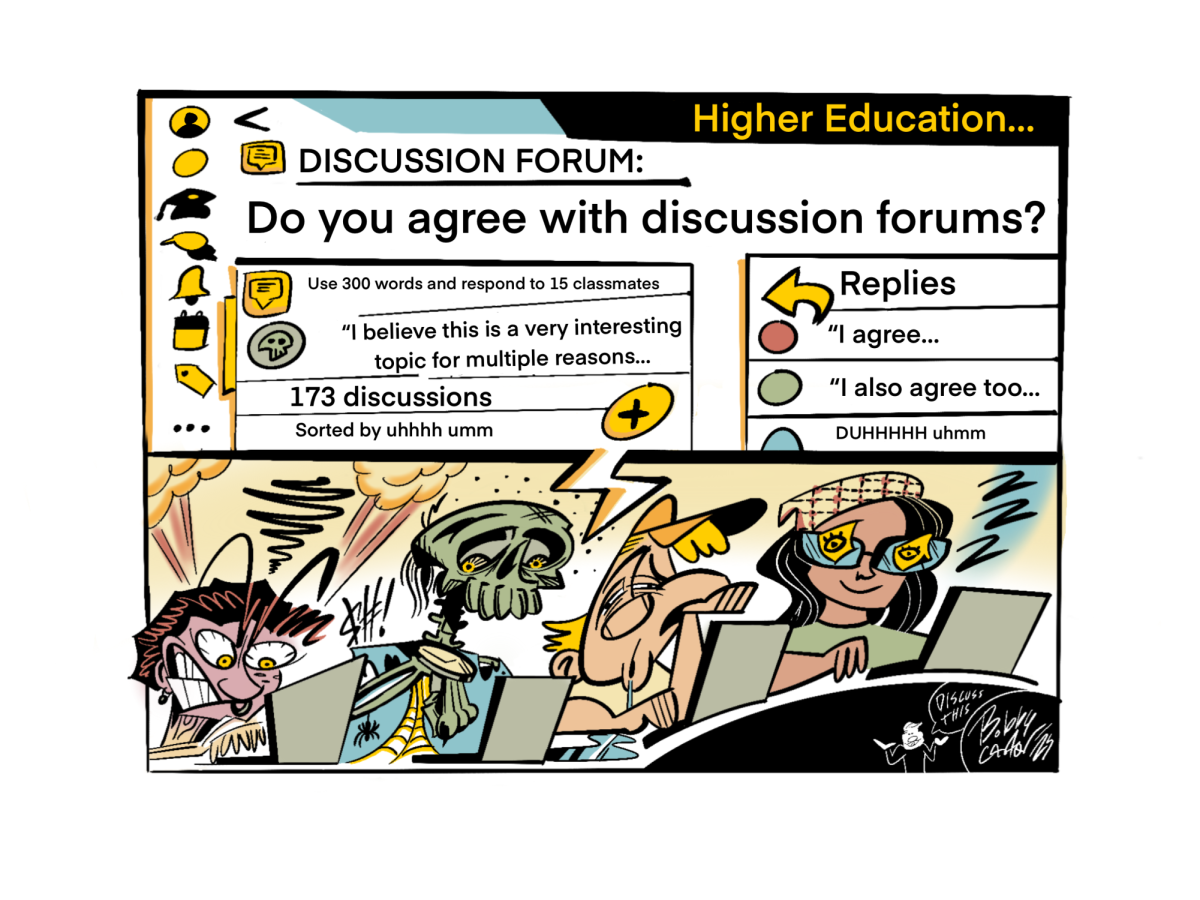In college courses, teachers assign discussion boards as a way to have students interact with the material and each other. However, this method can be more infuriating than helpful to most.
Discussion boards are forums where students apply what they learn in class and delve deeper into the content. Teachers do this by assigning students the task of writing a post for the forum and responding to around two of their classmates. Discussion boards are especially favored in asynchronous courses.
What teachers hope to achieve with this method is a deeper understanding of the course’s content as well as peer discussion. However, many students argue this does neither of the two.
A discussion board assignment can be tedious and unreasonably time-consuming. Discussion boards can often be classified as busy work, meaning students do it for a few points and it takes time out of their day to do so. In college, time management is a skill that needs to be utilized, and unnecessary work like discussion boards have to be crammed into an already tight schedule.
When posting a discussion board post, students’ classmates are all able to see and respond. No matter the size of the class, this premise can be uncomfortable.
Replying to fellow students is just as tedious and unnecessary. Often, the replies are the same copy and paste comments just to check the assignment of the to-do list. No student with a large workload is going to spend time reading their peers’ work to respond with something “thought-provoking.” In no way is responding to peers’ work furthering any education.
If a teacher is going to use a discussion board for an online class as a way for peer interaction, groups on Zoom would be much more effective. They require actual communication in class and aren’t just two sentence replies in a forum. Instead, students are speaking directly to their classmates.
If students are in an in-person class, most students find in-class discussions much more engaging than a forum. With in-class discussions, they are able to add their own input and debate conflicts while in the moment, rather than replying to a peer later online. Discussion boards do not promote any actual communication.
Some teachers will input a word count minimum for discussion board forum posts and replies. This tactic is useless as it doesn’t compel the students to try harder than they are. Rather, they are typing as much as they can to hit the minimum target. This is even more apparent in replies, with soulless responses of the same vague filler.
The only useful trait of discussion board assignments is the slight boost in grades, however they frequently only count for five to 10 points. In this case, the boost in grades is only if you’re assigned a discussion board more often than not.
Many students do not take these assignments seriously and most likely aren’t going to gain anything out of them. Discussion boards are not productive and instead waste educational time rather than enhance it. There’s no “deeper understanding” of an assignment you can easily Google.



MuChao • Mar 27, 2025 at 9:46 am
I mean, this pretty much just boils down to the same problems faced by educators no matter the assignments they give:
1) No matter what the assignment is, students are going to complain about it and deem it a “waste of time.” Exams? Waste of time. Homework readings? Waste of time. Forums? Waste of time. Papers? Waste of time. Class discussions? Waste of time. Lectures? Waste of time. Labs? Waste of time. Projects? Waste of time. I’ve heard complaints about all of these in my > decade teaching. At what point do universities just stop doing anything and simply exchange a degree for cash directly?
2) Students who are engaged, work hard, and who view university as more than simply a means to an end (i.e. a piece of paper for employment opportunities) are going to engage and work hard on most assignments, whatever they are. That’s certainly been my experience as someone who’s both been a student and who has worked with >4000 students in my time teaching.
3) Students who are going to half-ass assignments because for them university is simply at the end of the day a piece of paper for better job prospects are going to half-ass any/all assignments, no matter what they are.
While I don’t necessarily disagree with some of your complaints about forums, as I’ve had to grade no shortage of apathetic, cut-and-paste forum posts and replies, and while I definitely prefer in-class discussions as much as possible, you do (correctly) state that these assignments are normally used in asynchronous courses. That’s how I use them. But your alternative is impractical. How can an educator expect students to have live Zoom sessions to discuss topics for an online, asynchronous class? By definition a student takes an asynchronous course so that they can complete work on their own time, at their own pace, without being held to a strict daily/hourly schedule.
To your last points: “Many students do not take these assignments seriously and most likely aren’t going to gain anything out of them.” & “There’s no “deeper understanding” of an assignment you can easily Google.”
Exactly. That’s my point. Those students who are not going to take university seriously as an opportunity to expand their horizons and open their minds are not going to engage on most any assignment. They are going to do whatever bare minimum is necessary to pass the class so they can move on, graduate, get their piece of paper, and hope for a job.
I don’t necessarily blame these students, btw, it’s depressing, but I get it. If we were a sane country that provided free public higher-ed so that students were not indebting themselves to loan sharks just so they can attend increasingly expensive schools due to administrative bloat and expensive athletics programs, all in the hopes of better jobs, then it would be way easier to treat university in the way it should be treated: an invitation to think, discuss, be exposed to and experience novelty and new ideas, and expand horizons.